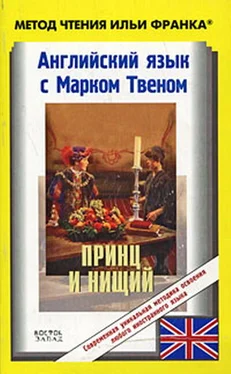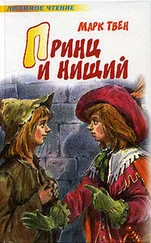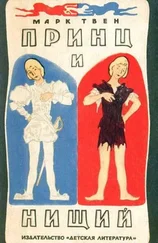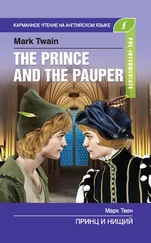He also took that old lawyer out of prison (он также вытащил того старого адвоката из тюрьмы; to take out — вытащить: «взять наружу») and remitted his fine (и простил его штраф). He provided good homes (он предоставил хорошие дома) for the daughters of the two Baptist women (дочерям двух баптисток) whom he saw burned at the stake (которых он видел сожженными у столба), and roundly punished the official (и хорошенько наказал официала = судью церковного суда) who laid the undeserved stripes (который обрушил незаслуженную порку; to lay — класть) upon Miles Hendon's back (на спину Майлса Хендона).
He saved from the gallows the boy (он спас от виселицы мальчика) who had captured the stray falcon (который поймал заблудившегося ястреба), and also the woman who had stolen the remnant of cloth from a weaver (и также женщину, которая украла отрез ткани у ткача; to steal — красть); but he was too late (но он был слишком поздним = опоздал) to save the man who had been convicted (чтобы спасти человека, который был приговорен) of killing a deer in the royal forest (за убийство оленя в королевском парке).
He showed favor to the justice (он выказал милость судье) who had pitied him (который пожалел его) when he was supposed to have stolen a pig (когда его обвиняли в краже поросенка: «когда он был предполагаем украсть поросенка»), and he had the gratification of (и он имел вознаграждение в том, чтобы) seeing him grow in the public esteem (видеть, как он растет в общественном мнении) and become a great and honored man (и становится большим и уважаемым человеком).
desert [dı`zə:t], couple [kApl]
WHEN the mysteries were all cleared up, it came out, by confession of Hugh Hendon, that his wife had repudiated Miles by his command that day at Hendon Hall — a command assisted and supported by the perfectly trustworthy promise that if she did not deny that he was Miles Hendon, and stand firmly to it, he would have her life; whereupon she said take it, she did not value it — and she would not repudiate Miles; then her husband said he would spare her life, but have Miles assassinated! This was a different matter; so she gave her word and kept it.
Hugh was not prosecuted for his threats or for stealing his brother's estates and title, because the wife and brother would not testify against him — and the former would not have been allowed to do it, even if she had wanted to. Hugh deserted his wife and went over to the continent, where he presently died; and by and by the Earl of Kent married his relict. There were grand times and rejoicings at Hendon village when the couple paid their first visit to the Hall.
Tom Canty's father was never heard of again.
The king sought out the farmer who had been branded and sold as a slave, and reclaimed him from his evil life with the Ruffler's gang, and put him in the way of a comfortable livelihood.
He also took that old lawyer out of prison and remitted his fine. He provided good homes for the daughters of the two Baptist women whom he saw burned at the stake, and roundly punished the fficial who laid the undeserved stripes upon Miles Hendon's back.
He saved from the gallows the boy who had captured the stray falcon, and also the woman who had stolen the remnant of cloth from a weaver; but he was too late to save the man who had been convicted of killing a deer in the royal forest.
He showed favor to the justice who had pitied him when he was supposed to have stolen a pig, and he had the gratification of seeing him grow in the public esteem and become a great and honored man.
As long as the king lived (так долго, как король жил = всю свою жизнь) he was fond of (он любил: «был любящим») telling the story of his adventures (рассказывать историю своих приключений), all through (целиком: «всю через»), from the hour that the sentinel (с того часа, когда часовой) cuffed him away from the palace gate (отогнал его прочь от дворцовых ворот; to cuff — бить) till the final midnight (до последней: «финальной» полуночи) when he deftly mixed himself into a gang of hurrying workmen (когда он ловко смешался с ватагой спешащих рабочих; to mix — смешивать) and so slipped into the Abbey (и так проскользнул в Аббатство) and climbed up (и забрался вверх) and hid himself in the Confessor's tomb (и спрятался в гробнице Исповедника; to hide — прятать(ся)), and then slept so long (и затем проспал так долго; to sleep — спать), next day (на следующий день), that he came within one of missing the Coronation altogether (что он чуть не пропустил коронацию совсем: «что он пришел в пределы одного от того = близко к тому, чтобы пропустить коронацию совсем»). He said that the frequent rehearsing of the precious lesson (он говорил, что частое повторение этого драгоценного урока) kept him strong (хранило его сильным = поддерживало его) in his purpose (в его намерении) to make its teachings yield benefits to his people (заставить его уроки принести плоды его народу); and so, while his life was spared (и поэтому, пока его жизнь была пощажена = покуда он был жив) he should continue to tell the story (он бы продолжал рассказывать эту историю), and thus keep its sorrowful spectacles fresh in his memory (и так хранить ее печальные картины свежими в его памяти) and the springs of pity replenished in his heart (и источники сострадания полными: «пополненными» в его сердце).
Miles Hendon and Tom Canty were favorites of the king (Майлс Хендон и Том Кэнти были любимцами короля), all through his brief reign (все время его короткого правления: «все через его короткое правление»), and his sincere mourners (и его искренними плакальщиками = искренне скорбели о нем) when he died (когда он умер). The good Earl of Kent had too much good sense (добрый граф Кентский имел слишком много благоразумия: «хорошего разума») to abuse his peculiar privilege (чтобы злоупотреблять своей особой привилегией); but he exercised it twice (но он воспользовался ею дважды) after the instance we have seen of it (после того случая, который мы видели) before he was called from the world (прежде чем он был призван из мира); once at the accession of Queen Mary (однажды при восшествии на престол королевы Марии), and once at the accession of Queen Elizabeth (и однажды при восшествии на престол королевы Елизаветы). A descendant of his (один потомок его) exercised it (воспользовался ею) at the accession of James I (при восшествии на престол Якова Первого). Before this one's son (прежде чем этого = его сын) chose to use the privilege (выбрал = решил воспользоваться этой привилегией; to choose — выбирать), near a quarter of a century had elapsed (почти четверть века прошла), and the 'privilege of the Kents' had faded out (и «привилегия Кентов» испарилась) of most people's memories (из памяти большинства людей); so, when the Kent of that day (так что, когда Кент того времени) appeared before Charles I and his court (появился перед Карлом Первым и его двором) and sat down in the sovereign's presence (и уселся в присутствии суверена; to sit down — усесться: «сесть вниз») to assert and perpetuate (чтобы заявить о и увековечить) the right of his house (это право своего дома), there was a fine stir, indeed (был настоящий переполох, действительно)! But the matter was soon explained (но это дело было вскоре разъяснено) and the right confirmed (и право — подтверждено). The last earl of the line (последний граф в этом роду) fell in the wars (пал в войнах; to fall — пасть) of the Commonwealth (Английской республики = времен революции; the Commonwealth of England — Английская республика, существовавшая в 1649-1660 гг.) fighting for the king (сражаясь за короля), and the odd privilege (и эта странная привилегия) ended with him (закончилась с ним).
Читать дальше
Конец ознакомительного отрывка
Купить книгу




![Марк Твен - Принц и нищий [Издание 1941 г.]](/books/148799/mark-tven-princ-i-nichij-izdanie-1941-g-thumb.webp)







